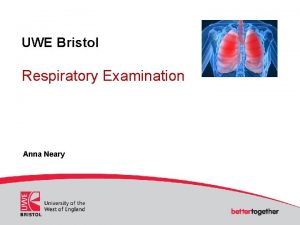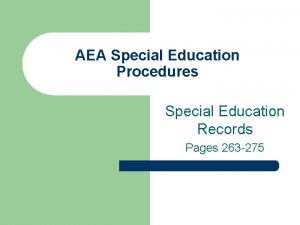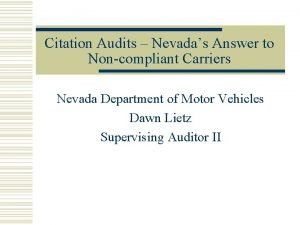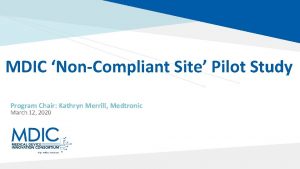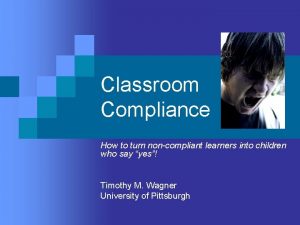SPECIAL EDUCATION PROCEDURES TO ADDRESS NONCOMPLIANT FINDINGS RELATED










- Slides: 10

SPECIAL EDUCATION PROCEDURES TO ADDRESS NONCOMPLIANT FINDINGS RELATED TO CHILD FIND Presenter Jim Kubaiko, Director Special Education

Child Find School districts must inform the public about available special education programs and services and how to access those programs and services. When: Annually and ongoing Statement example: “It is the policy of ______Academy that all children who have or are suspected of having a disability under Part B of the Individuals with Disabilities Act (IDEA) and are in need of special education programs and services are identified, located and evaluated. If you know of or have a child who may have a disability, please contact_______. ”

Child Find Responsibilities Procedures to locate, evaluate and identify students who may qualify for special education programs and services The academy will publically display a written statement that the academy serves all students, including those with a disability and parents or staff who suspect that a child may have a disability should contact the school leader. The academy will utilize Response to Intervention (Rt. I) and Positive Behavior Intervention Support (PBIS) as schoolwide initiatives to review concerns about student academic and behavioral performance. Rt. I was designed to assist schools in identifying students who may have a learning disability. The academy has chosen this process to identify such students for a special education referral based on documented and reviewed data on the student’s response to interventions. At any time during the Rt. I process, staff or parents may request that a student be referred for a special education evaluation by submitting a request in writing to the school leader.

Child Study Team Process The purpose of the Child Study Team is to provide assistance to the teacher in identifying strategies to address concerns prior to making a referral for a special education evaluation. It is a component of the Rt. I process and the Rt. I team may conduct the Child Study process. If a teacher feels that a student is not responding to instruction or schoolwide positive behavior intervention support, a referral may be made to the Child Study Team to review Rt. I/PBIS data and related interventions used by the teacher in an effort to address concerns through alternate interventions. Teachers implement recommended interventions for a prescribed period and a follow up meeting is scheduled to review the results of the interventions. If the team determines that an immediate referral for a special education is needed or a parent prefers not to utilize the Child Study process, a REED must be scheduled and appropriate evaluations completed. Written Child Study referral procedures and meeting guidelines will be provided to all teachers. Parents will also be informed of the Child Study process.

What is a Special Education Referral? A special education referral is a written statement that a child may have a suspected disability that interferes with learning and may need special education programs and services. Anyone who is concerned, including parents, teachers, social workers, licensed physicians, nurses, foster parents, or representatives of other agencies, may refer a person suspected of having a disability. Requests must be submitted in writing to the school principal or other appropriate local district representative.

When a Special Education Referral is Submitted a REED Meeting is Scheduled Within 10 school days of receiving a request to evaluate, the special education teacher will contact the parent and other relevant staff to schedule a REED (Review of Existing Evaluation Data) The reason for the referral and concerns about the student’s performance will be discussed. Rt. I/Child Study and other relevant data from the parent and teacher will be reviewed. Evaluations that are needed will be identified. The parent will be given a copy of procedural safeguards and asked to give permission to evaluate and sign the REED document. The signed REED document will be given to the school leader for review and signature. Once the REED is signed by the parent and school leader, special education timelines begin.

Special Education Timelines The time from when the district receives the signed parental consent for an evaluation to the notice of an offer of FAPE or the determination of ineligibility shall not be more than 30 school days. The timeline begins upon receipt by administrative signature of the signed parental consent from the REED meeting. The timeline for an initial evaluation may be extended with a signed written agreement between the parent and school identifying the reason for the delay and the additional days needed.

Special Education Timelines • • • The special education teacher will maintain a planning calendar with the date of the administrative signature indicating receipt of the signed REED and the date the MET/IEPT meeting must be convened. The special education teacher will contact appropriate members of the MET (Multidisciplinary Evaluation Team) to provide them with copies of the signed REED and request that evaluations be scheduled. MET members will identify approximate time needed to complete their evaluations and notify the special education teacher of any delays in the evaluation process. After 15 school days following receipt of parent consent to evaluate the special education teacher will check with evaluators on progress and provide support in addressing any issues that may impact meeting timelines. The director of special education will also be contacted if there are issues that may affect meeting timelines. Following consultation with the evaluators on an agreed on date, the special education teacher will contact the parent to schedule the MET/IEPT meeting at least 10 days in advance of the meeting. A second contact will be made within a day if the teacher was not able to contact the parent. All evaluators will provide the special education teacher with copies of evaluation results prior to the scheduled MET/IEP meeting. The special education teacher will arrange for a written invitation to be sent to the parent to confirm the meeting date. All evaluators will also be sent a copy. The special education teacher will keep a written log of contacts and meeting dates.

Special Education Timelines Within 7 school days of the initial IEPT meeting, the public agency shall provide the parent with notice of offer of FAPE or determination of ineligibility. The parent has 10 school days after receipt of the initial offer of FAPE to provide written parental consent to provide initial special education programs and services. Unless the parent has filed an appeal, the district shall initiate the IEP within 15 school days. Students with an IEP from a previous school district who transfer to the district in the same school year shall immediately be provided FAPE by implementing their current IEP or a modified IEP through completion of a Previous Enrollment form. Any modifications to the current IEP require that a new IEP must be held within 30 school days to revise the changes made in the student’s special education program and services.

Questions?
 Physical memory vs logical memory
Physical memory vs logical memory Two type of physical fitness
Two type of physical fitness Health related fitness and skill related fitness
Health related fitness and skill related fitness Harris drip enema
Harris drip enema Primitive physical education
Primitive physical education Chapter 10 qualitative research designs
Chapter 10 qualitative research designs Mid clavicular line
Mid clavicular line Findings in research
Findings in research Findings in research
Findings in research Qualitative and quantitative data analysis
Qualitative and quantitative data analysis Regio thorax posterior
Regio thorax posterior






